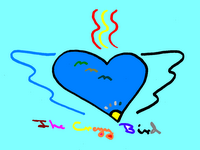 The monster is dead, shall we dance? I think not!
The monster is dead, shall we dance? I think not!First of all, like so many others, the monster was our creature, or at least so we thought and even then, as long as it served what we then thought to be our purpose and needs, we tolerated its, uhm, occasional excesses.
It was only when it would no longer obey our bidding that we took him down.
It is all too convenient and easy to demonize. In fact it is dangerous, a cop out which allows us to project our own failings on the monster of choice, or, more correctly, the image of its public persona.
True, justice must be served, else human society cannot exist. On the other hand, we are all connected in ways whose subtlety we normally do not perceive.
When we lick our lips at the smell of the blood of a dying monster, a new monster, closer to home, is conceived.
This particular monster we see dangling from its rope, fed birds with bread from its prison meals, watered plants in garden, once read good night stories for its children and gave his guard and nurse, Robert Ellis, a hug when he had to go back stateside to be with his dying brother.
How can we comprehend such things? It's like there is some sort of disconnect. Perhaps it can help to distinguish between Saddam, the monster, and Victor (which was the name of the prisoner during his stay in Camp Cropper.
I want to tell you a story taken from the diary kept by my great-great grand uncle, Nathan Whitney Watson, on his journey from Chicago to Salt Lake City in 1858.
One morning, while they were out on the prairie, weeks away from the nearest outpost of civilization, a terrible thing happened. One of the trail hands murdered the trail master. He grabbed him from behind by the hair and slit his throat with a bowie knife -- this happened in front of the trail master's wife and in full public view.
The trail hand then took some provisions in a bag and a rifle, saying that he would shoot the first man who tried to follow him. However, a dozen men followed him and with rifles raised and aimed at him, surrounded him, closed in and finally took him into custody.
A jury was then appointed, a judge, prosecutor and attorney for the defense. The facts were laid out, the man was found guilty and that same night, just before midnight, in the light of a full moon the trail hand was hung from a tree.
My uncle says that they buried him, at the trail hand's request, beside the man he had murdered that very morning.
I get different reactions when I tell that story, but people generally miss the point that the little society of the wagon train had little choice. They could not in all reality have kept him as a prisoner for weeks, neither could they let him flee. Their fabric of their small society could not take the strain of either insult.
It is a different question with a larger society -- although I am not an absolute opponent of capital punishment, I do feel that it is a sign of weakness and sickness in societies which use it more than the most extreme rarity.
Saddam is dead, but what of Victor? The one was a monster, the other a a human being, was he not?
Perhaps you do not or even cannot see my point of view. To paraphrase Robert Fisk and twist his words a bit, Victor took with him the secrets of the monster and our complicity did not die with him.




No comments:
Post a Comment